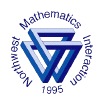Topic: Mathematics in Entertainment!
Local Hosts: Ronda and Will Webber
The Mathematics of Juggling: Mike Naylor
Circus Clown-turned-mathematician Michael Naylor combines his careers
for this dynamic presentation on the mathematics of the patterns of
patterns of juggling. Learn how juggling moves can be codified and organized,
and how the notation can be used to find new patterns and tricks. Clown
noses optional.
The Mathematics of Pretty Pictures (The Spirograph): Will and
Ronda Webber
In this session we will investigate the mathematics of spirographs.
We will begin by using a spirograph to generate some pretty pictures.
In the creation of the spirograph images we will collect data that we
can analyze. We will discover the differences between cycloids, epicycloids
and hypocycloids. From this point we will split into two groups. The
first group will determine a pattern from the data we collect, so that
if we want a particular image we can figure out which gears to use.
The second group will determine how to use parametric equations to get
a computer to draw these images. Finally we will bring both groups back
together to share the findings with everyone.
Will's computer spirograph can be found at http://www.livemath.com/livemathboard/.
On this page log in to Will Webber's Math Classes and scroll down to
Odds and Ends and then Spirograph. You will need to download the Livemath
plugin to interact with the animation.
The Mathematics of Music: Joyce Frost
We will look at how mathematics has shaped western music: from the
development of note frequencies to our modern scales. We will also look
at why different instruments sound they way they do based on overtones
and mathematics
Mathematics of Projects*: Workshop participants, organized
by Ronda Webber
This will be time for each of you to look at and discuss, projects
brought by your colleagues. We are asking each of you to bring a short
write-up and examples of a favorite project. We will set these up as
displays in one room so that everyone can simply walk around the room
and have open discussion time.
*Participants are encouraged to bring a project or activity to present
for the Mathematics of Projects session.

